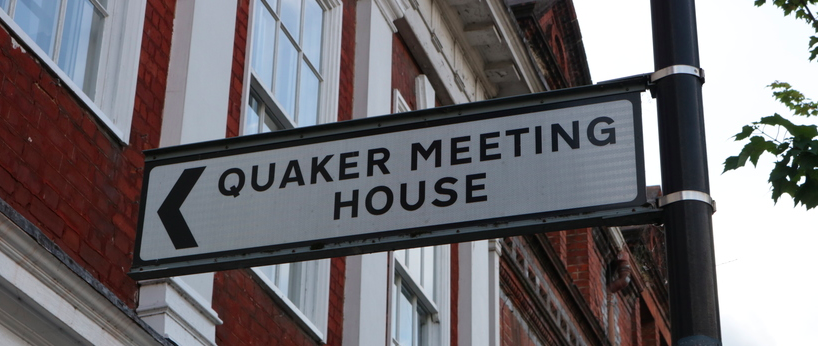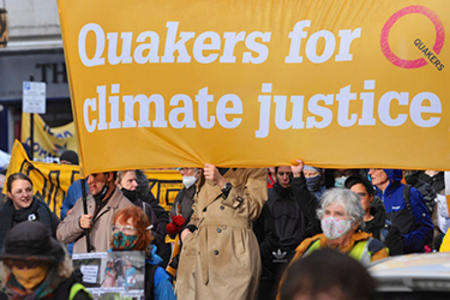Generations of Quakers have handed down a sacred commitment to the 'unity of creation'. To live out this commitment, Quakers are taking action to protect the climate and foster sustainable forms of prosperity.
Today, Quaker activism for climate and economic justice takes place in local meetings, within workplaces, and through political advocacy and direct action.
An evolving spiritual concern
Quaker concern for the Earth and the wellbeing of all who live in it is deeply rooted in our faith. Early Quakers knew that to damage the earth just for human 'outward greatness' would be an injustice on future generations.
Quakers reaffirmed our commitment to act as a faith community in 2011 with the 'Canterbury Commitment' (minute 36 of Britain Yearly Meeting). This called on Quakers to act in new ways – individually, as local communities, as a corporate body of faith, and politically.
The Canterbury Commitment recognised that the environmental crisis is enmeshed with global economic injustice and that tackling inequality is central to taking action on the climate emergency. It made clear that this is a spiritual task.
Climate breakdown is also a concern of Quakers around the world. International gatherings of Quakers in 2012 and 2015 concluded with strong calls for climate action across the globe.
[QUOTE-START]
Quakers are 'called to be patterns and examples in a 21st century campaign for peace and ecojustice, as difficult and decisive as the 18th and 19th century drive to abolish slavery'
– The Kabarak Call for Peace and Ecojustice, 2012
[QUOTE-END]
Valuing people and planet
The current economic system has provided humanity with many material benefits. However those benefits have been unequally shared. Many of them have been brought about through the over-exploitation of the Earth's natural resources.
Quakers have committed to work towards a different kind of economic system based on our belief in a fundamental human equality and respect for the Earth.
'The global economic system is posited on continued expansion and growth, and in its pursuit of growth it is often unjust, violent and destructive… We need to ask the question whether this system is so broken that we must urgently work with others of faith and good will to put in its place a different system in which our testimonies can flourish.' – Minute 23, Britain Yearly Meeting 2011
'The new economy' refers to an economic system that values human wellbeing, fairness and sustainability above profits.
For Quakers, the new economy makes possible 'a way of living that will free us from the bondage of material things and mere conventions, that will raise no barrier between man and man, and will put no excessive burden of labour upon any by reason of our superfluous demands.'
Take action!
A sustainable and prosperous economy is essential for everybody. On our
climate justice and building the new economy pages we talk about actions everyone can take as individuals or in groups. Here we outline a few actions your Quaker community can take together to sustain fairer economic systems.
Divest from fossil fuels
We need to confront the powers that actively work against climate justice, namely the fossil fuel industry and economic systems reliant on fossil fuels, which put economic competitiveness ahead of ecological health.
- Host a discussion about divestment. You could check out our PDF guide to divesting from fossil fuels, share it with Friends and/or your community, and then discuss the practical and ethical implications together.
- Watch a divestment documentary as a group. Do the Math by climate campaigner Bill McKibben explains why we need to keep fossil fuels underground and is available to watch for free on YouTube.
- Withdraw fossil fuel investments. We can take action by withdrawing any investments we have in fossil fuel companies, as individuals or as a community. This is called divestment, and it fits into a long history of Quaker concern about the ethical use of money (PDF).
- Re-invest ethically. Divestment also enables ethical re-investment. We can invest our money in the parts of the economy that we want to nurture. We can support community energy projects or sustainable housing. By reinvesting money into green, just alternatives we help to build the 'new economy' that Quakers also advocate for.
Quakers in Britain: first church to divest from fossil fuels
Quakers in Britain were the first church in Britain to divest our centrally held money from fossil fuels. By divesting we help to question the morality of the fossil fuel industry, and challenge its power. Read more about Britain Yearly Meeting's decision to divest in this briefing: Divestment from fossil fuels (PDF).
'Investing in companies who are engaged in fossil fuel extraction is incompatible with Quakers' commitment to become a low-carbon community.' – Meeting for Sufferings, 2013
Quaker meeting divestments

How did Quaker area meetings in Britain divest from fossil fuels? Read what the treasurers of three different area meetings have to say about
their divestment journeys.
Become a Living Wage employer
Quakers are inspired by faith to build a more equal world. Since 2014, Quakers have been campaigning on the Living Wage as part of our testimony to equality. The Living Wage is based on the cost of living and is voluntarily paid by over 4,700 UK employers who believe that workers deserve to be paid fairly.
Quakers in Britain: Living Wage Employers
Britain Yearly Meeting has been a Living Wage Employer since 2013. All staff are paid within a 1:4 ratio and above the London Living Wage, which as of 2021 is £10.85 per hour.
Friends House Hospitality Company, the commercial body within Britain Yearly Meeting, has a values-based tendering process that means that suppliers are encouraged to become Living Wage Employers, if they have not already done so. Read more about Friends House Hospitality Company.
Quaker Living Wage organisations and meetings
There are now a number of Quaker Living Wage employer organisations, businesses, and area meetings.
Quakers in Lancaster have set up a Quaker Living Wage campaign, and provide meetings with materials and information (offsite link) about how to become certified as a Living Wage employer. The Quaker Living Wage Campaign works with the Living Wage Foundation (offsite link) to help Quaker organisations become accredited Living Wage Employers.
The Quaker Living Wage campaign also includes a map that shows the area meeting districts that now pay a Living Wage to all employees. It shows: area meetings that do currently pay the Living Wage, but are not formally accredited; area meetings who do not employ staff; and undeclared area meetings. In this first draft of the map, islands off the mainland coast are not shown.
View the Quaker living wage campaign map (PDF).
Can you help fill in the map? Submit information about your area meeting's Living Wage status to the Lancaster Quaker Living Wage Campaign – email livingwage@lancsquakers.org.uk.
Take part in a programme for faith groups
Open up conversations about money, faith and a fairer world with a structured, step-by-step programme. The Ecumenical Council for Corporate Responsibility's (ECCR) Money Makes Change simple-to-use resources are designed for small faith groups. Use these to inspire a range of conversations and actions. Browse what's on offer on the ECCR website.
Quaker Climate Action database
We know many Quakers took action for the UN climate talks – COP26 – last year and you will be continuing to take action against climate breakdown this year. To celebrate this and help connect you, we have now launched our database sharing information about Quaker climate action around the UK!
Please email
climatejustice@quaker.org.uk to request the link to the database and the password to open it.
We decided to create an online database to record Quaker climate action after you asked us what kind of climate action other Quakers were planning last year. We are very conscious that as a team of part-time staff, we often end up as bottlenecks responding to requests like this and we want to try to reduce that!
The database will be a place for Quakers to share information about the action you are taking and your contact details. We will then make this securely available for other Quakers to access so you can read about one another's actions and get in touch with each other directly.
Our hope is that the database will serve as a snapshot of action across the UK so you can use it to tell everyone a little about who you are and what you're working on in general terms. A bit like a big phone book but for Quaker climate action!
The database won't be fast-moving enough to serve as a place to advertise events. However, if you include a link to a webpage where people can find out more, that can also serve as a way to make sure we all know about your upcoming events. To submit your own entry to the database about action you are taking individually, in your meeting or in a local group, please
fill in this form.
Minutes and resources
In 2015 Quakers globally signed a statement on climate change that has been used at the UN climate negotiations.
Download: Quaker statement on climate change (PDF).
The
Quaker United Nations Office (offsite link) runs a programme on human impacts of climate change. Sustainability is a key focus for Friends World Committee for Consultation (FWCC)(offsite link).
The Kabarak Call for Peace and Ecojustice was issued in 2012 by the World Conference of Friends (the global body of Quakers). The Kabarak Call recognises that many environmental crises are driven by our economic system.
Download: Kabarak Call for Peace and Ecojustice (PDF).

